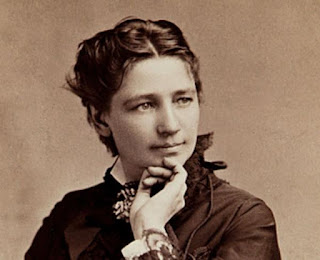In 1872, that is 144 years before Hillary Clinton’s run for US President, Victoria Woodhull was the first woman to run for President of the United States and Woodhull remains a significant milestone in the history of American women’s politics. Her life story, marked by perseverance and advocacy, continues to inspire generations of women to challenge societal norms and pursue their aspirations. Woodhull’s contributions to women’s rights and her groundbreaking presidential candidacy paved the way for future female leaders in the political arena to continue the effort to break the highest, hardest glass ceiling in politics.
Victoria Woodhull, born on September 23, 1838,
in Homer, Ohio, emerged from a life of poverty and adversity to become a
trailblazer in American politics. Her journey from a tumultuous childhood to
the forefront of the women’s rights movement is a testament to her resilience
and pioneering spirit. Woodhull’s candidacy in the 1872 presidential election
marked a significant milestone in the fight for gender equality in the United
States.
Early Life and Struggles
Victoria Woodhull was one of ten children in a
family plagued by hardship. Her mother was illiterate, and her father was a
criminal. Despite these challenging beginnings, Woodhull displayed an early
determination to overcome her circumstances. She began elementary school at the
age of eight but dropped out three years later. At the age of fifteen, she
married Dr. Canning Woodhull, an alcoholic, which forced her to support her
family through various jobs, including working as a clerk, seamstress, actress,
and spiritual medium.
Advocacy for Free Love and Women’s Rights
The onset of the Civil War marked a pivotal
point in Woodhull’s life. She divorced her husband but retained his surname,
reflecting her growing independence. The divorce led her to become involved in
the Free Love movement, which sought to make it easier for women to leave
abusive marriages and argued that issues like divorce and birth control were
personal matters, not state concerns. Woodhull famously proclaimed, “Let women
issue a declaration of independence sexually, and absolutely refuse to cohabit
with men until they are acknowledged as equals in everything, and the victory
would be won in a single week.”
Rise to Prominence
During the Civil War, Woodhull worked as a
healer alongside her sister Tennessee. Through this work, she met Colonel James
Blood, whom she married after the war, and Cornelius Vanderbilt, a wealthy
railroad tycoon. These connections proved crucial for Woodhull’s future
endeavours. In 1868, she and her sister moved to New York City, where they
continued working as clairvoyants for Vanderbilt. The sisters amassed
significant wealth from stock tips provided by Vanderbilt, enabling them to
open Woodhull, Claflin & Co. in 1870, becoming the first female
stockbrokers on Wall Street.
Political and Social Advocacy
Woodhull utilized her newfound platform to
advocate for women’s rights, labourers, and the poor. She founded Woodhull
and Claflin’s Weekly, a newspaper promoting Free Love, women’s suffrage,
and political reform. This publication served as a critical vehicle for
Woodhull’s progressive ideas and her political aspirations.
Presidential Candidacy
In 1872, Victoria Woodhull made history by
becoming the first woman to run for President of the United States. Running on
the Equal Rights Party ticket, she championed a progressive platform that
included women’s suffrage, regulation of monopolies, nationalization of
railroads, an eight-hour workday, direct taxation, abolition of the death
penalty, and welfare for the poor. Frederick Douglass was selected as her
running mate, although he never formally acknowledged the nomination. Despite
her groundbreaking candidacy, Woodhull’s votes were minimal and went largely
uncounted.
Decline and Legacy
After the election, Woodhull’s political
career declined rapidly. Her personal life, often sensationalized in her
newspaper, alienated key allies like Susan B. Anthony and Elizabeth Cady
Stanton. Consequently, she was ostracized from the suffrage movement and
received no further invitations to speak at conventions.
Disillusioned, Woodhull moved to England in
1877, where she married into a wealthy family and became a patron of the arts.
Although she never saw her activism fully realized in the United States, she
lived to witness the achievement of women’s suffrage in Great Britain. Victoria
Woodhull passed away on June 9, 1927, at the age of 88.

No comments:
Post a Comment
Thanks for your thoughts, comments and opinions, will be in touch. Peter Clarke